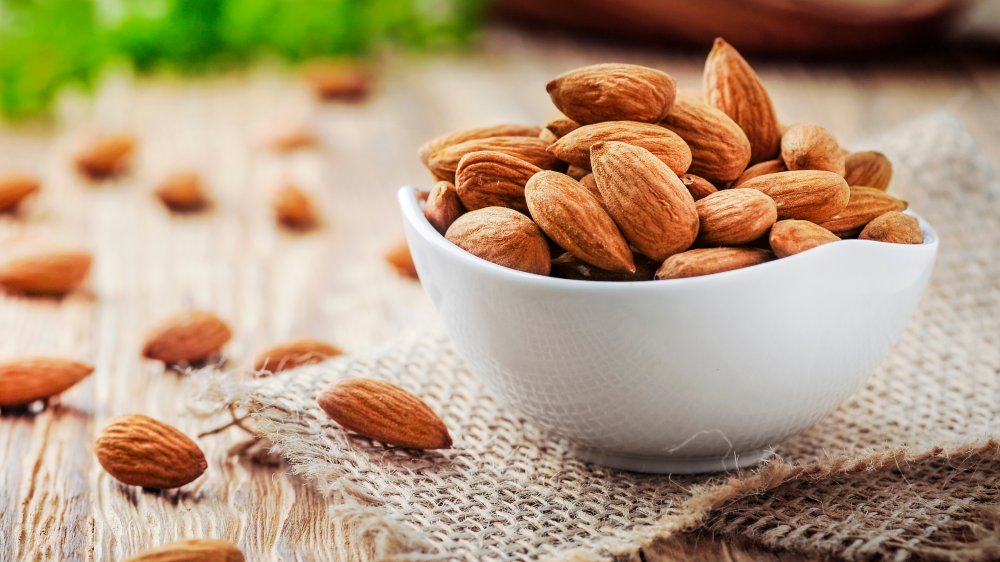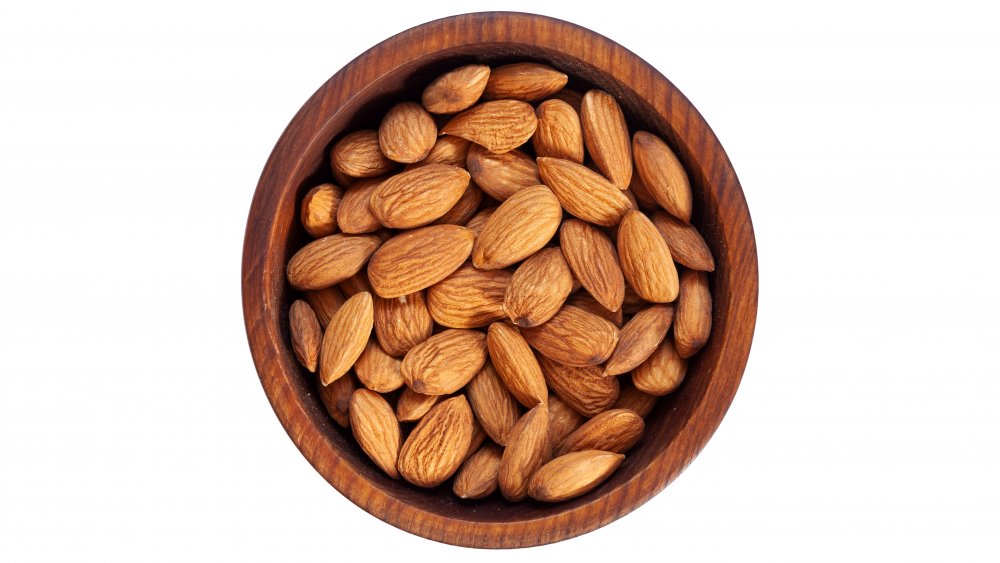When You Eat Almonds Every Day, This Is What Happens To Your Body
If you're nuts about choosing to eat almonds every day, you're not alone. Citing an article originally published in The Washington Post, Salon named almonds America's No. 1 nut in 2014. Between 2005 and 2014, per capita almond consumption rose a staggering 220 percent, hitting more than two pounds per person annually.
That's pretty impressive, considering almonds aren't technically even a nut. From a botanist's perspective, almonds are actually a drupe — a thin-skinned fruit containing a single seed at its center. So an almond is actually a stone fruit, similar to peaches, cherries, and plums, as noted by HuffPost. In fact, many "nuts" are not true nuts.
Whatever you call them, almonds come in many varieties and can be enjoyed in a number of ways. They can be eaten whole as a quick snack or chopped and mixed into sweet and savory dishes. They can be consumed raw or roasted, skin-on or blanched, ground into flour or turned into delicious nut butter. But are these versatile "nuts" good for you? This is what happens to your body when you eat almonds every day.
If you eat almonds every day, your body will get more vitamin E
The little almond packs a big antioxidant punch, thanks in large part to its high vitamin E content.
Nutritionist Lisa Richards told The List, "Almonds are a significant food source of vitamin E, a potent antioxidant with several health benefits. Antioxidants ... fight free radical damage in the body." She explained that free radicals cause cellular damage, and this damage, combined with inflammation, can cause or worsen chronic illnesses like cancer, obesity, and heart disease.
The National Institutes of Health (NIH) recommends that adults get at least 15 mg of vitamin E each day. According to Richards, a single ounce of almonds provides more than a third of this requirement. In addition to vitamin E's antioxidant properties, the Mayo Clinic pointed out that vitamin E has an important role to play in the health of our eyes, skin, brain, and reproductive system. If you eat almonds every day, you may also receive some support if you suffer from Alzheimer's disease or liver disease.
When you eat almonds every day, you could help manage blood sugar levels
Whether you're diabetic or not, managing blood sugar levels is important for optimal health. According to Medical News Today, non-diabetics should aim to have a fasting blood glucose level less than 100 mg/dL and a level less than 140 mg/dL an hour or two after eating. For individuals with diabetes, the targets are less than 130 mg/dL and 180 mg/dL, respectively.
High blood sugar levels can have a wide variety of negative effects, including putting you at greater risk for heart disease, kidney damage, nerve damage, and vision loss. Luckily, if you eat almonds every day, you can help manage blood sugar levels on two fronts. First, they're low in sugar and carbohydrates, containing only 1.1 g of sugar and 0.2 g of starch per one-ounce serving. Second, almonds are high in magnesium (a one-ounce serving provides almost a fifth of your daily needs).
You could help lower your blood pressure when you eat almonds every day
When you eat almonds every day, the magnesium you consume can greatly benefit your health, specifically when it comes to blood pressure. Nutritionist Lisa Richards told The List, "[Magnesium is] a mineral essential to blood pressure regulation ... Magnesium has been found to directly reduce blood pressure in individuals with high blood pressure, from mild to more severe cases."
The Centers for Disease Control and Prevention (CDC) reports that 45 percent of American adults — about 108 million people — suffer from hypertension ("defined as a systolic blood pressure [greater than] 130 mm Hg or a diastolic blood pressure [greater than] 80 mm Hg"). Alarmingly, the CDC notes that only about one in four people with hypertension have their condition under control. According to the Mayo Clinic, high blood pressure often produces no symptoms but, over time, the excessive force can damage the walls of your arteries. This damage puts you at greater risk for a number of life-threatening medical emergencies, including heart attack, stroke, and brain aneurysms, as well as chronic conditions such as dementia and metabolic syndrome.
If you eat almonds every day, could you help combat depression?
While choosing to eat almonds every day is definitely no substitute for therapy or antidepressants, they could potentially help lift your spirits and chase away the blues if eaten with certain other foods. Registered dietitian Kristen Carli told The List, "Because they are a great source of the amino acid tryptophan, almonds are best paired with a source of vitamin B6 such as a banana. Vitamin B6 has been shown to convert tryptophan to serotonin, reducing depression symptoms." To get these mood-boosting benefits, Carli recommends pairing a banana with an ounce of almonds or a tablespoon of almond butter.
Depression is very common. According to the Depression and Bipolar Support Alliance (DBSA), more than 17 million adult Americans (approximately seven percent of the U.S. adult population) are affected by major depressive disorder. While depression can affect anyone, women are twice as likely as men to experience depression.
As noted on Healthline, serotonin is a chemical found mostly in the digestive system but also in the central nervous system, which includes the brain. While serotonin levels in the blood usually range between 101 and 283 nanograms per milliliter, those suffering from depression often have below-average concentrations of this important substance.
You could better maintain or lose weight if you eat almonds every day
According to research conducted by the Centers for Disease Control and Prevention's National Center for Health Statistics (NCHS) and reported in Time in 2018, 56.4 percent of American women were actively trying to lose weight. If you're one of them, you may better reach your goals if you eat almonds every day.
Registered dietitian Trista Best told The List, "Almonds are a unique food in that they are low in carbohydrates, but high in fiber and protein. These characteristics make them effective at curbing appetite and satisfying hunger. Because of this they can allow you to take in fewer calories [overall]."
But when it comes to snacking on almonds to help manage weight, you can definitely overdo it and end up causing more harm than good. Registered dietitian Megan Wong explained to The List, "Nuts are high in calories because they pack in a good amount of healthy fats. Stick to a quarter cup (around the size of your palm) serving each day to avoid excess calories."
If you eat almonds every day, you can help build stronger bones
If you don't like drinking milk, almonds are another great option for maintaining bone health. Health educator Shana Robinson told The List, "While calcium usually gets top billing when it comes to bone health, lesser-discussed essential minerals manganese and copper play best supporting mineral roles in building bone mineral density." Almonds are a great source of both minerals — a one-ounce serving contains 14 percent of your daily copper needs and 32 percent of your manganese requirement.
But how exactly do these minerals help to keep bones strong? According to Robinson, "Manganese is a key contributor in the development and maintenance of bone, while one of the many jobs of copper is to assist in the formation of collagen for bone."
Osteoporosis may not be on your radar right now, but maintaining strong bones is important throughout adulthood. According to the National Institutes of Health (NIH), women tend to reach peak bone mass by their late 20s. From about age 30 until menopause, bone density remains relatively constant if a healthy lifestyle is maintained, but in the first few years of menopause it often rapidly decreases. So, you may just want to eat almonds every day.
When you eat almonds every day, you may become more regular
Having trouble going No. 2? Instead of reaching for the laxatives, try adding more fiber-packed almonds to your diet. Registered dietitian Megan Wong told The List, "You'll get a healthy boost of fiber [from eating almonds], which most people don't consume enough of. Most of this fiber is insoluble — the kind that helps move things along the digestive tract." The Mayo Clinic recommends women get between 21 and 25 grams of fiber every day. It considers almonds a high-fiber food, providing 3.5 g in a one-ounce serving (about 23 nuts). Unfortunately, the average American gets only about 15 grams of fiber a day, according to WebMD.
While almost everyone experiences constipation from time to time, frequent difficulty passing stool can have serious consequences. According to the Mayo Clinic, chronic constipation can lead to painful hemorrhoids (swollen veins in and near your anus), anal tears, and rectal prolapse (when a portion of the intestine protrudes outside the anus).
When it comes to the fiber you receive when you eat almonds every day, there's an added bonus. As Wong explained, "You're also getting some soluble fiber. Soluble fiber helps with improving cholesterol levels and managing blood sugar — key for those with heart disease and diabetes."
If you need to get your cholesterol under control, eat almonds every day
High cholesterol is a major problem in the United States. According to the Centers for Disease Control and Prevention (CDC), 95 million American adults over the age of 20 have total cholesterol levels higher than 200 mg/dL, and about 29 million of those have total cholesterol levels higher than 240 mg/dL.
But according to registered dietitian Mark Wendle at Fitness Savvy, almonds are an excellent way to balance high-density lipoprotein (HDL, "good") and low-density lipoprotein (LDL, "bad") cholesterol. He told The List, "The fat content of almonds comprises a high proportion of monounsaturated fat. This type of fat influences the level of good (HDL) cholesterol versus LDL cholesterol (the cholesterol which forms plaques in the blood vessels of the body, including the coronary arteries that supply the heart."
Importantly, almonds also appear to prevent LDL cholesterol from oxidizing, a critical step in the heart disease process. According to a study conducted by a team of researchers led by David J.A. Jenkins and published in 2002 in the journal Circulation, eating almonds every day for a month lowered subjects' oxidized LDL levels.
If you want to get the most nutritional bang for your buck, eat almonds every day that have skin
Choosing skin-on versus skinned (blanched) almonds may seem like a simple matter of taste preference, but it can have a big impact on just how healthy your healthy snack actually is.
According to a study conducted by Chung-Yen Chen and colleagues at Tufts University and published in The Journal of Nutrition in 2005, the flavonoids (phytonutrients with antioxidant properties) in almonds are found predominantly in their skin. They work in tandem with the vitamin E and vitamin C found in the meat of the nut to help prevent oxidation of low-density lipoprotein (LDL, "bad") cholesterol. The researchers found that, when taken together, the flavonoids and vitamins had a greater protective effect than when either was administered alone. This suggests that eating skin-on almonds provides more heart-health benefits than skinned almonds.
In a paper published in the Journal of Agricultural and Food Chemistry in 2006, a research team led by Paul E. Milbury set out to identify the flavonoids present in almond skin. They found 18 flavonoids, including isorhamnetin, kaempferol, catechin, quercetin, and epicatechin.
When it comes to certain nutrients, you should eat raw almonds every day rather than roasted almonds
If you're trying to select the healthiest option when looking to eat almonds every day, you'll want to consider choosing raw or roasted nuts. According to Healthline, roasting (whether dry or in oil) is usually done to enhance almonds' flavor, aroma, and crunchy texture. While the roasting process doesn't do much to change the calorie, fat, carbohydrate, and protein content of almonds, it does make the polyunsaturated fats in the nuts more likely to oxidize, which could cause free radical damage to cells throughout the body.
Roasting also decreases the amount of certain vitamins and other micronutrients. A 2017 study led by Wolfgang Stuetz and published in the journal Food Chemistry found that almonds' levels of thiamine (vitamin B1), carotenoids (pigments with antioxidant properties), and tocopherol (vitamin E) were drastically reduced after the nuts were roasted.
Roasting may also create dangerous byproducts. A paper published in Food Chemistry in 2015 concluded that roasting almonds produced high levels of acrylamide, a substance that the National Toxicology Program believes is "reasonably anticipated to be a human carcinogen" based on animal studies.
If you're trying to reduce your sodium intake, eat unsalted or lightly salted almonds every day
Salt may make things taste better, but getting too much sodium can be bad for your health. The 2015–2020 Dietary Guidelines for Americans (DGA) recommends that Americans get no more than 2,300 mg of sodium each day. The DGA noted, however, that the average American gets over 3,400 mg of sodium daily. Roughly 70 percent of this sodium comes from "processed food and restaurant meals."
While almonds may be much more natural than the processed food providing most of the sodium in Americans' diets, they can certainly contribute to the issue. SFGate reported that a single ounce of salted nuts will cost you between four and eight percent of your daily sodium "budget." That's not a big deal if the rest of your diet is predominantly whole foods, but if you indulge in processed food regularly, those salty almonds may push your sodium intake into unhealthy territory.
According to Harvard Medical School, excess salt can raise blood pressure, especially in individuals who already have high blood pressure. This, in turn, increases your risk for cardiovascular disease. So, if you want to eat almonds every day, you may not want to select salted almonds.
You may not want to eat almonds every day if you're worried about kidney stones
Although almonds contain a number of health-promoting micronutrients, they also contain the "anti-nutrient" oxalate. According to Healthline, oxalate (oxalic acid) is an organic compound found in many plant foods. Oxalate binds to minerals — usually calcium — to create crystals, and these crystals leave the body through both stool and urine. In some individuals, however, these crystals collect in the kidneys and become kidney stones.
While several substances can concentrate in the kidneys and become stones, the National Kidney Foundation notes that calcium oxalate accounts for 80 percent of all kidney stones. These stones can be extremely painful to pass and may require surgical removal. They're also much more common than you might think: Roughly 7 percent of women and 13 percent of men will get kidney stones at least once in their lives, and having one kidney stone puts you at a higher risk for additional stones in the future.
For people trying to avoid kidney stones, the bad news is that almonds are very high in oxalate, so you may want to add them to your list of the worst foods for your kidneys. The University of Chicago noted that individuals eating a low-oxalate diet must limit themselves to no more than 11 almonds a day.
If you eat almonds every day, you could consume the anti-nutrient phytate
Phytate is an anti-nutrient in almonds you may need to worry about. According to Healthline, phytate (phytic acid) is a substance found in the seeds of plants that provides a stored source of the mineral phosphorous, which the seed will need when it begins to grow. When humans eat almonds, however, the phytate can impair the absorption of minerals such as iron, zinc, and calcium and may lead to mineral deficiencies. Healthline notes that almonds are very high in this anti-nutrient, containing between 0.4 and 9.4 percent phytate by dry weight.
Sprouting almonds before eating them, however, is a great way to reduce the nuts' phytate levels. Nutrition educator Mira Dessy told The List, "Phytic acid binds to minerals such as magnesium and zinc. After sprouting, these minerals are more bio-available due to the removal of the phytic acid coating."
If you've never tried it before, sprouting nuts and seeds is quite easy — all it takes is a bit of water, salt, and time. In a since-deleted post on her website, The Ingredient Guru, Dessy provided instructions, and suggested soaking almonds for 8 to 12 hours to properly sprout them.
If you have a tree nut allergy, you may want to avoid eating almonds every day
It should go without saying that you should avoid a food if you're allergic to it, but when it comes to almonds, things are a bit more complicated. According to the American Academy of Allergy, Asthma and Immunology (AAAAI), allergy to tree nuts (almonds, Brazil nuts, cashews, hazelnuts, pecans, pistachios, and walnuts) is common in the United States, affecting 0.5 to 1 percent of all Americans. But because tree nuts are a very diverse group, being allergic to one tree nut doesn't mean you'll have a reaction to the others. The AAAAI noted that some tree nuts are closely related and thus likely to cause identical reactions — for example, cashews and pistachios or pecans and walnuts.
Allergy to almonds specifically, however, appears to be quite "rare," according to research published in the journal Nutrients in 2018. The researchers noted that, among Americans, walnuts and cashews were the tree nuts most likely to cause an allergic reaction.
Luckily, under the Food Allergen Labeling and Consumer Protection Act of 2004, manufacturers must clearly state the exact type of nuts their product contains.














